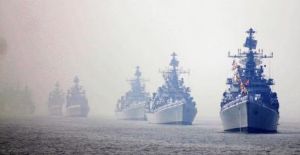
New Delhi, August 27: The defence ministry has virtually shot down a renewed bid by the Navy to get additional supplies of missiles to arm the Israeli Barak-I anti-missile defence (AMD) systems fitted on 14 frontline warships, including solitary aircraft carrier INS Viraat and three new Shivalik-class stealth frigates.
While the MoD led by defence minister AK Antony accepted the "critical operational urgency'' for acquiring the 262 Barak-I missiles at a cost of over $140 million, it indicated last week that its hands were tied due to the pending CBI investigation into the infamous Barak kickbacks case, sources said.
"Legal opinion obtained from the law ministry and the solicitor general holds that the fresh procurement case should not be progressed for the cabinet committee on security till the CBI probe is complete,'' said a source.
But with the CBI investigation failing to reach anywhere in the last six years, a desperate Navy may now be forced to make a case for seeking fresh legal opinion. Confronted with a critical shortfall in the missile reserve stocks, the Navy has been forced to curtail even practice firings of the Barak-I AMD systems integrated into the 14 warships as part of their "combat management systems''.
"In the current political situation and scams swirling all around, nobody wants to stick his neck out even if inaction adversely impacts national security needs,'' said an insider. There are fears the Bofors howitzer scandal of the late-1980s, which completely derailed the Army's entire artillery modernisation programme from which it is yet to recover, is being repeated yet again.
Much like the Bofor guns which proved their worth during the 1999 Kargil conflict, the Navy swears by the Barak-I systems that act as "close-in point defence systems'' for warships to intercept incoming sea-skimming missiles with "pin-point accuracy'' at a 9-km range.
The recent Naresh Chandra Committee report, incidentally, has also held there is a need to relook at the entire process of cancelling arms contracts or blacklisting defence firms since they can prove counter-productive to the nation's security.
Interestingly enough, it was the NDA regime that had inked the initial Rs 1,160 crore deal for nine Barak-I AMD systems, along with 200 missiles worth Rs 350 crore, from Israeli Aerospace Industries (IAI) and Rafael in October 2000. This was considered necessary to counter Pakistan's acquisition of sea-skimming Exocet and Harpoon missiles after the indigenous Trishul AMD system failed to become operational.
Subsequently, under the UPA-I government in October 2006, the CBI registered the FIR in the Barak kickbacks case to name former defence minister George Fernandes, his party associates Jaya Jaitely and RK Jain, alleged arms dealer Suresh Nanda and former Navy chief Admiral Sushil Kumar among the accused.
While the probe lingers, India is also now in the final stages of developing long-range surface-to-air (LR-SAM) and medium-range SAM systems in collaboration with IAI. While the LR-SAM project to arm naval warships is worth Rs 2,606 crore, the MR-SAM one for IAF is pegged Rs 10,076 crore. With effective interception ranges of 70-km each, their deliveries will begin from 2013 onwards.





Comments
Add new comment